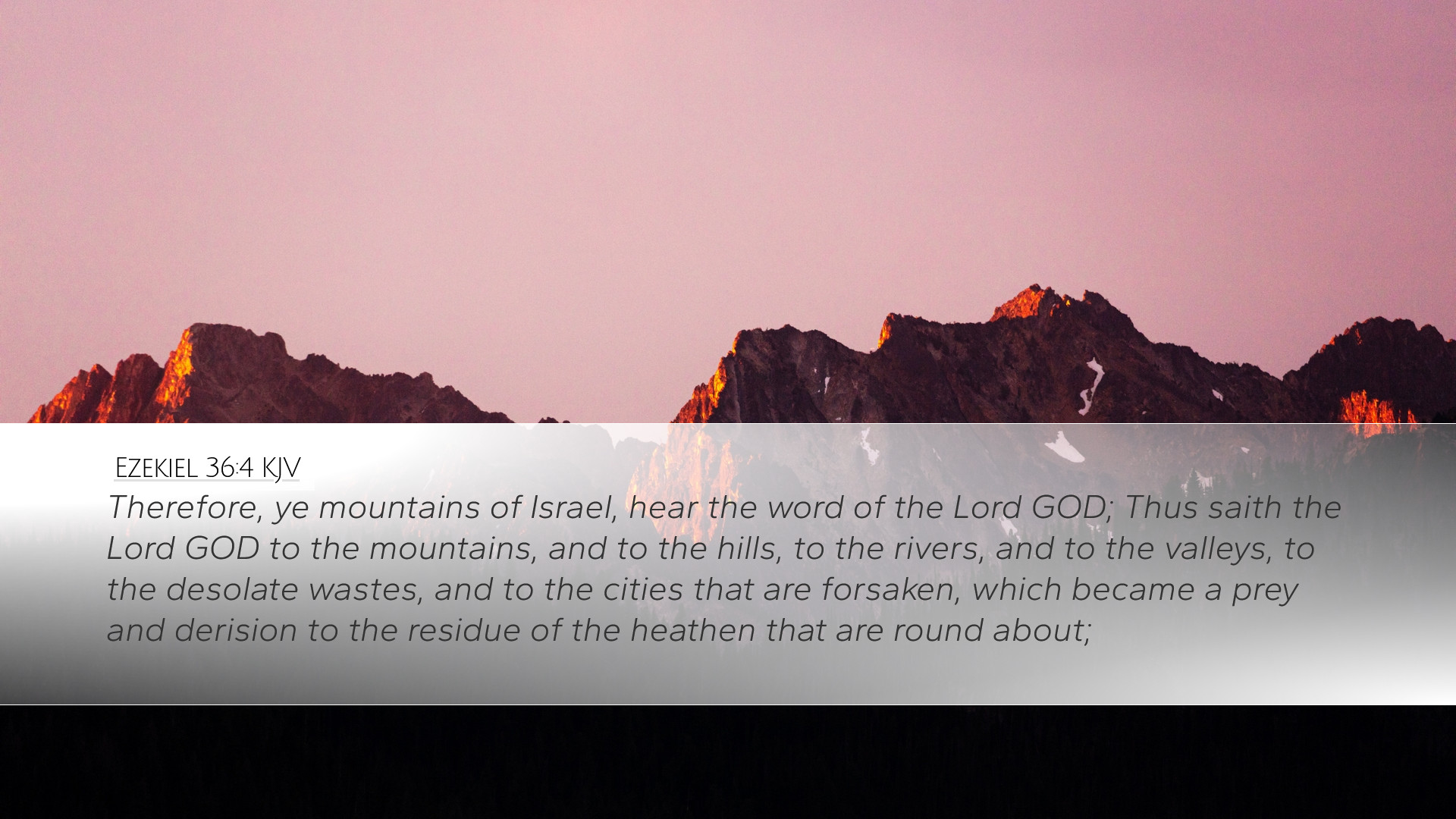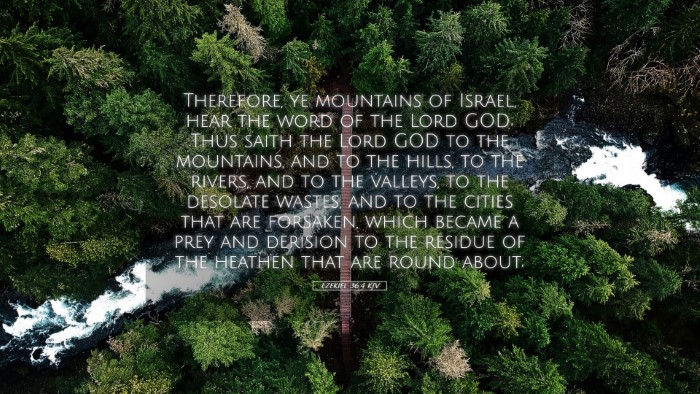Commentary on Ezekiel 36:4
Bible Verse: Ezekiel 36:4 - "Therefore, O mountains of Israel, hear the word of the Lord God: Thus says the Lord God to the mountains and to the hills, to the ravines and to the valleys: Behold, I, even I, will bring to you a sword, and I will destroy your high places."
Introduction
The prophetic words of Ezekiel speak powerfully to the people of Israel, addressing not only human beings but also the geographical landmarks of the land. This verse serves as a profound reminder of the sovereignty of God over creation and His intimate connection with His people. Here, we explore the insights offered by noted Bible commentators such as Matthew Henry, Albert Barnes, and Adam Clarke to elucidate the theological and practical implications of this verse.
Contextual Overview
Ezekiel's ministry occurred during the Babylonian exile, a time of desolation for Israel. The chapter captures God's promise of restoration, emphasizing His desire to reclaim and revitalize His people and their homeland. The mountains and hills, symbols of strength and permanence, are called to listen to the divine proclamation that signals both judgment and renewal.
Insights from Matthew Henry
Matthew Henry provides a thorough exploration of the implications of God's message to the mountains of Israel. He emphasizes the importance of listening to God's voice, highlighting several key themes:
- The Authority of God: God's command to the mountains underscores His ultimate authority over all creation. The mountains are imperative to heed His word, illustrating that even the most steadfast elements of nature are subject to divine sovereignty.
- The Call to Accountability: By addressing the land directly, God emphasizes the accountability of creation in relation to human sin. The high places, often linked to idolatry, represent both spiritual corruption and the need for divine intervention.
- Hope for Restoration: Despite the harsh judgment of the sword, Henry notes that this announcement foreshadows a forthcoming blessing. The mention of destruction implies a necessary purging that will set the stage for future restoration and glory.
Insights from Albert Barnes
Albert Barnes offers a precise analysis of the symbolic nature of the mountains and God's proclamation:
- Symbolism of the Mountains: The mountains represent the national identity of Israel. Barnes notes that addressing them symbolizes God's recognition of the land's relationship to its people, reinforcing the significance of their heritage.
- Judicial Decision: The 'sword' mentioned in the verse represents divine judgment against idolatry and sin. Barnes articulates that this imagery serves as a stark reminder of the consequences of turning away from God.
- Promise of Renewal: Barnes expounds on the dual nature of God's message: it serves both as a warning and a promise. Following judgment, there exists a profound promise of restoration and revival for the land and the people.
Insights from Adam Clarke
Adam Clarke's commentary sheds light on the broader implications of Israel as a physical and spiritual entity:
- Divine Sovereignty: Clarke highlights that God's call to inanimate creation reinforces His sovereignty. The mountains and valleys, which seem to exist independently of human affairs, are reminded that they play a role in God's overarching plan.
- The Role of the High Places: The high places, often associated with false worship, fundamentally corrupted the purity of Israel's religious practices. Clarke insists that God must address these as they are pivotal in understanding Israel's spiritual decline.
- Anticipation of Restoration: Clarke also emphasizes the significance of looking forward, as this text points towards a future time when Israel will be restored, turning their hearts back to God and revitalizing their spiritual practices.
Theological Implications
The theological implications of Ezekiel 36:4 extend beyond the immediate context of Israel. They encompass overarching truths about God's nature, judgment, and grace:
- The Narrative of Judgment and Mercy: God's willingness to address both judgment and mercy portrays a God who desires to correct rather than to destroy. This is a crucial theme throughout Scripture.
- The Involvement of Creation in Redemption: The invitation of the mountains to listen to God's word illustrates the interconnectedness of all creation in God's plan of redemption. This theological understanding ties into the broader narrative of creation's anticipation of restoration in Christ.
- Call to Holiness: As leaders in the church, pastors and theologians must emphasize the call to holiness and the significance of repudiating all forms of idolatry and spiritual corruption in their congregations.
Practical Applications
From the insights gathered, several practical applications emerge for pastors, students, and theologians:
- Encouraging Spiritual Discipline: Understanding the call to accountability requires encouraging personal and communal spiritual disciplines that reflect the holiness of God.
- Emphasizing the Importance of Repentance: Just as Israel was called to turn from its idolatrous ways, pastors must emphasize the role of repentance for renewal and restoration in the lives of their congregants.
- Recognizing God's Sovereignty: Instilling in church members the belief in God's sovereignty over all aspects of life can comfort and strengthen faith in tumultuous times.
Conclusion
Ezekiel 36:4 serves as a pivotal reminder of God's authoritative voice over all creation, His judgment regarding idolatry, and the hopeful promise of restoration. By reflecting deeply on the insights of revered biblical commentators, we are urged to recognize our roles within God's narrative of redemption, facilitating a spirit of renewal within our communities.


